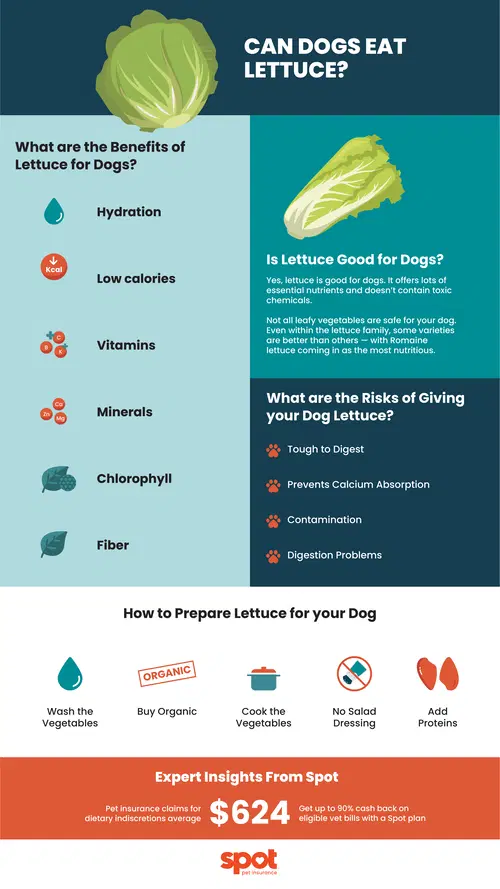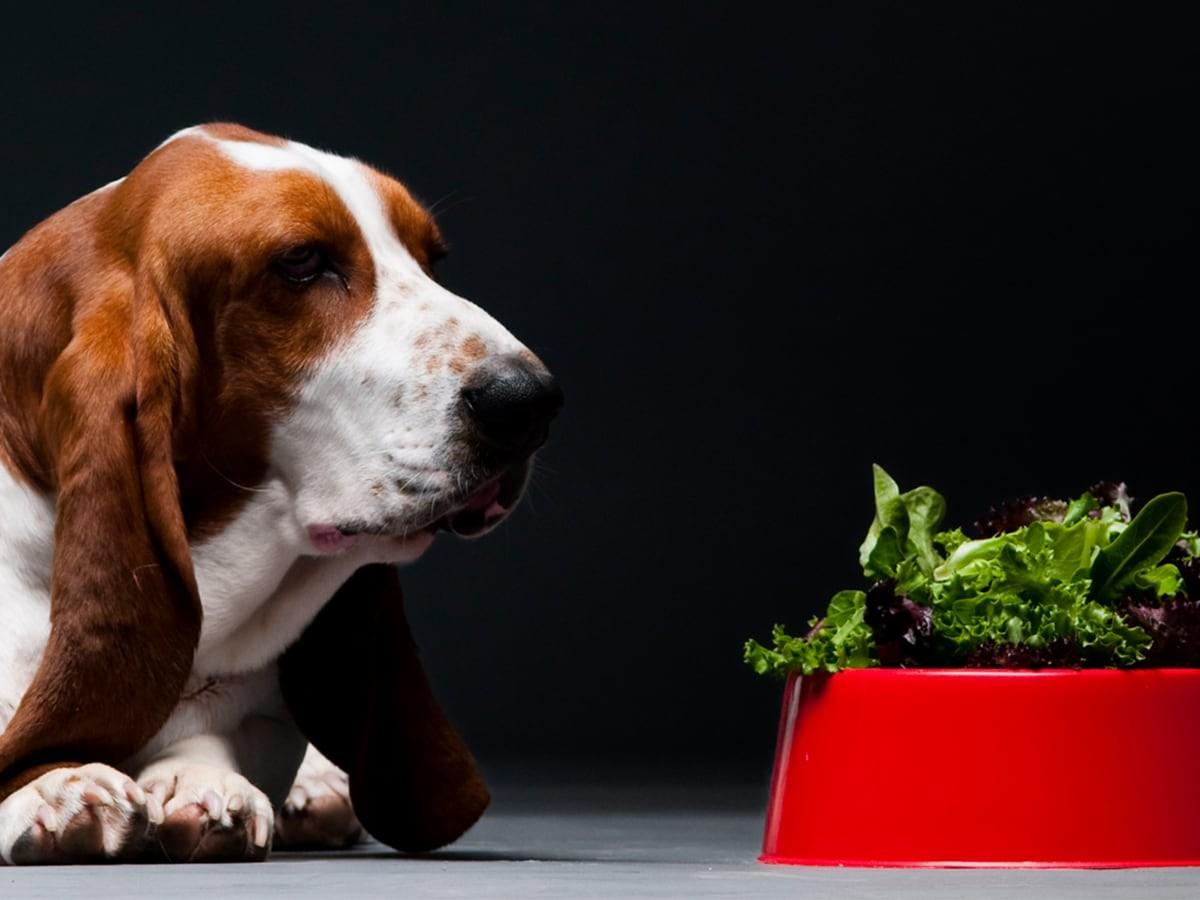As a dog parent, you want to care for your pets and help keep them healthy. Choosing the right diet is only one of many responsibilities, so you might be overwhelmed with which foods your dog can and can’t eat.
Is lettuce worth a shot for your dogs? Does it offer health benefits or pose health risks? Spot Pet Insurance will explain the details below so you can make the right choice for your pup.

Is Lettuce Good for Dogs?
Yes, lettuce can be good for dogs. It offers lots of essential nutrients and isn't considered toxic for your pup.1
Not all leafy vegetables are safe for your dog. Even within the lettuce family, some varieties are better than others — with Romaine lettuce coming in as one of the most nutritious.1
What Are The Benefits of Lettuce for Dogs?
Lettuce contains vital nutrients that can contribute to your dog’s health in several ways. Below, we’ll break down a few of the key benefits.
Hydration: Lettuce is more than 90% water.1 When the scorching summer sun is high in the sky, try freezing some lettuce and presenting it to your dog. The frozen leaves can help rehydrate and cool your fur baby — and they can provide extra comfort for teething pups.
Low Calories: Many pet parents don’t want to give their dogs too many calories. It’s a genuine concern because excess calories aren’t good for your dog’s health. Smaller dogs like Chihuahuas have to watch their calorie intake closely since obesity is a common health risk for them.2 Lettuce can be a great low-calorie meal addition.
Vitamin C: Vitamin C from lettuce may help boost your dog’s ability to fight infections. It may also help your dogs heal properly after an injury and maintain vital structures such as bone and muscle systems.3
Vitamin K: Vitamin K, another nutrient found in lettuce, promotes healthy blood clotting, reduces the risk of excessive bleeding, and aids in wound healing.3
Vitamin A: Help protect your dog’s eyes by ensuring they’re not lacking in vitamin A. Lettuce is a great source of this key vitamin, which helps fight oxidative damage and support reproductive health.3
Minerals: Your dogs can also get several minerals from lettuce to help their bodies function normally. These minerals include:4
Calcium
Potassium
Magnesium
Phosphorus
Chlorophyll: Leafy greens like lettuce contain chlorophyll, the compound that gives lettuce its green color. In dogs, it may help fight mouth odor and help replenish your dog’s blood cells.
Chlorophyll can also serve as a detox, cleansing your dog’s body of toxins and helping promote better metabolism.4
Fiber: Your dog’s gut needs fiber to function properly. A diet without fiber can cause digestive health problems such as constipation.
Lettuce can provide fiber that aids in digestion and helps satiate your dog.4 That means they won’t feel hungry too quickly after a meal, which in turn helps them maintain a healthy weight.
What Does Lettuce Do To Your Dog’s Kidneys?
Lettuce contains mostly water. Hydration is essential for helping remove toxins from your dog’s body, and lettuce provides lots of fluids - helping support this process.
Potential Health Risks of Giving Lettuce to Dogs
Tough to Digest
Lettuce leaves are fibrous and can be difficult for dogs to digest.
Chop lettuce into bite-sized pieces or lightly cook it to aid digestion.
May Prevent Calcium Absorption
Excessive vegetables, including lettuce, can interfere with calcium absorption.
Spinach, for example, contains oxalic acid, which reduces calcium uptake and may affect kidney function.
Lettuce has lower oxalic acid levels but should still be given in moderation.5
Risk of Contamination
Raw lettuce can carry harmful bacteria like E. coli, Listeria, or Salmonella.4
Always wash lettuce thoroughly before feeding it to your dog.
Digestive Upset
Introducing lettuce too quickly can cause gas, bloating, diarrhea, or stomach discomfort.4
Start with small amounts and observe your dog’s reaction.
Possible Allergic Reactions
While rare, some dogs may be allergic to lettuce.
Watch for symptoms such as sneezing, coughing, wheezing, or hives.
Discontinue feeding lettuce if any of these signs appear.
While giving your dog lettuce can be good for their health, there’s a limit. Eating lettuce all the time can negatively affect their health. Here are the potential health risks of giving your dog lettuce:
Expert Insights From Spot
Sharing our favorite foods with our pets can be tempting, but it's important to know that not all human foods are safe for dogs. Spot's internal data shows that pet insurance claims for dietary indiscretions average $642*, stressing the need for caution and thorough research before sharing snacks with your pet.
How to Prepare Lettuce for Your Dog
If you prepare lettuce correctly, your dog can enjoy lots of potential health benefits. Here’s how to do it right:
Wash the Vegetables: You should never skip this step when preparing lettuce since washing helps remove dirt, chemical residue, and microbes that can make your dogs sick. Pups may experience lethargy, fever, diarrhea, or vomiting if they get a bacterial infection from improperly prepared food.4
Chop the Lettuce: Pups may have a hard time digesting lettuce: it’s fibrous and can overwork their digestive system. Chopping up lettuce can makes it easier for them to digest and may also help reduce their chances of experiencing unpleasant digestive symptoms.1
While you can cook lettuce for your dogs, it’s not always necessary. Raw lettuce can be great for them, and frozen lettuce is both refreshing and hydrating.
No Salad Dressing: Now you know that your dogs can eat lettuce, does that mean you can share your salad with them? No! Many salad dressings contain oils, garlic, garlic, vinegar, and salt — all ingredients that aren’t great for dogs.
When preparing a salad for your dogs, simply wash and chop the vegetables. There’s no need to get fancy and add dressing.
Add Protein: Your dogs need a good amount of protein in their diet, so consider adding in a healthy animal protein. Tuna, sardines, beef, turkey, or chicken are all solid options, and they can even be mixed in with bite-sized pieces of lettuce for a meal your dog is sure to enjoy.
How Much Lettuce Can Dogs Eat?
Lettuce can be great for dogs, but they shouldn’t eat it excessively. Follow the 90-10 rule. No more than 10% of your dog's daily calories should come from treats, including lettuce.
If you want to optimize your dog’s diet so that they get the best nutrition, speak to your vet.
Key Takeaway
Dogs can eat lettuce! Lettuce can help rehydrate your dog on a hot day and can offer many other nutrients your dog might need. It can also provide additional fiber to help keep your pet satiated, and it’s low in calories, making it a healthy treat.
That said, make sure you prepare your dog’s lettuce properly. Wash the leaves to help rid them of toxins and microorganisms that can make your dog sick, and skip the salad dressing.
More About Spot Pet Insurance
Dog insurance can help provide financial assistance for covered veterinary care in case of unexpected accidents, illnesses, or injuries. Our plans can help pet parents manage the eligible costs of covered veterinary care and help ensure that their pets can receive the best treatment possible. Here are some ways that Spot pet insurance plans can help:
Covers Unexpected Veterinary Costs: Spot pet insurance plans help cover the eligible costs of unexpected veterinary treatments, such as emergency surgeries, X-rays, and prescription medications for covered conditions.
Customizable Plans: Choose your annual limit, reimbursement rate, and deductible from a range of options, and create the plan that will fit the needs of your pet and your budget.
Peace of Mind: With Spot pet insurance plans, pet parents can know that they can provide the best care for their pet with less worry about the cost.
To learn more about Spot Plans or to get a free quote, click here.

I’m Charlie: canine enthusiast with a knack for figuring out why my dog, Dallas, is more infatuated with tennis balls than me. My lifelong passion for dogs has created a dedication to help other pet parents better understands their furry family members!
*Jan 2019 to Aug 2024 administrator claims data.
Saylor, April. “Can Dogs Eat Lettuce?” Petmd.com, PetMD, 2 Mar. 2023, www.petmd.com/dog/nutrition/can-dogs-eat-lettuce.
American Kennel Club. “American Kennel Club.” American Kennel Club, n.d., www.akc.org/dog-breeds/chihuahua/.
Burke, Anna. “7 Vitamins Your Dog Needs for a Healthy Lifestyle.” American Kennel Club, American Kennel Club, 14 Mar. 2024, www.akc.org/expert-advice/nutrition/vitamins-dogs-need-healthy-lifestyle/.
Reimann, Jim. “Can Dogs Eat Lettuce?” Nextrition Pet, Nextrition Pet, 18 Mar. 2024, www.nextritionpet.com/blogs/nutrition/can-dogs-eat-lettuce.
Lotz, Kristina. “Can Dogs Eat Lettuce?” American Kennel Club, American Kennel Club, 24 Aug. 2022, www.akc.org/expert-advice/nutrition/can-dogs-eat-lettuce/. Accessed 8 Aug. 2024.
The information presented in this article is for educational and informational purposes only and does not constitute or substitute for the advice of your veterinarian.











